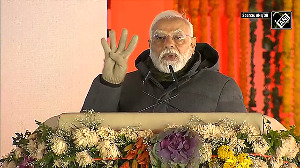United States Secretary of State Hillary Clinton has acknowledged that even with a firewall that has been constructed against the diversion of massive American military aid to Pakistan to the nuclear weapons programme, there are no ironclad guarantees that aid cannot be diverted and hence it remains a major concern to the US.
Clinton was appearing before the powerful Senate Foreign Relations Committee to defend the Obama administration's foreign aid budget for the fiscal year 2013, which includes $2.4 billion for Pakistan.
Senator Jim Webb, Virginia Democrat, pointed out that the aid "actually reflects an increase in funding for Pakistani military compared to last year". He also expressed concern about how Pakistan has been expanding its nuclear programme even as US economic and military largesse has continued to flow into that country.
Clinton said, "The fair question is: Even with a firewall, if you provide aid for other purposes, does that permit the government then to divert funds that should be spent for health, education, energy etc to that programme? And it remains a serious concern of mine, Senator."
She added, "Part of our ongoing and very tough dialogue with Pakistan is around the reforms they need to make for their own people."
Clinton pointed out, "They have invested the great bulk of their revenues into their military establishment, including their nuclear programme, to the great cost of, you know, providing basic education, health care, electricity -- the kinds of things that would demonstrate to the people of Pakistan they had a government that number one, cared about them; and number two, produced for them."
She reiterated, "I can answer the direct question -- Yes, we have a firewall, but that isn't the end of the dialogue -- as you know very well. And we are going to keep pressing hard to make sure that, you know, the IMF and the World Bank and we and others are working toward the kind of reforms that are going to stabilise Pakistan for the long term."
Webb called for a continued focus in this regard, and said more tough dialogue was imperative. "I had a number of discussions with (former chairman of the Joint Chiefs of Staff) Admiral (Mike) Mullen on this subject and it's something that I think we should really put at one of our highest security priorities."
He said, "I understand how that could be taken in a different way from the Pakistani side. But you can't not look at the way that they've expanded their nuclear programme and, you know, not want to try to figure out whether we are indirectly assisting it, which would not, clearly, be in our national interest."
Earlier, Senator Robert Casey, Pennsylvania Democrat, who recently visited Pakistan with several other US Senators, informed Clinton that despite the assurances Islamabad had provided their delegation about cracking down on elements that were providing components for improvised explosive devices, they had not delivered on these promises.
Casey said, "I would argue that despite the assurances they gave us on our trip -- and I mean assurances at the highest levels of their government that they would take this matter more seriously, that they implement the strategic plan that they had in writing that they presented to us -- it's my judgment that they've been very slow at implementing that, especially focusing on the networks that are moving these component parts that become the foundation of these roadside bombs, IEDs, that are either killing our troops on a regular basis in Afghanistan or grievously wounding them."
He asked Clinton whether from her observation "of their action or inaction on this, do you think there are any measurable steps they have taken to specifically go after the networks? Because I think that's what a lot of us are waiting to see, whether or not what their professed plan is becomes a plan of action and specific steps."
Clinton said that as she had informed Congress a few months ago, "I raised it at the very highest levels of the Pakistani government one more time. I discussed it at some length last Thursday in London with the foreign minister."
She acknowledged, "It's very clear they need to do more. And they need to do more for themselves. Our concern is very much rooted in the terrible attacks that take place in Afghanistan against our soldiers, against other targets there, but, you know, in 2011, there were 1,966 terrorist attacks in Pakistan, which resulted in 2,391 deaths, the vast majority of which were the IEDs".
"So our point to Pakistan has been, you know, this is not about the US, NATO, ISAF, Afghanistan alone; this is also about you. Now, what they have done is they have introduced legislation in their national assembly. I have been told they expect to pass it shortly," she said.









 © 2025
© 2025